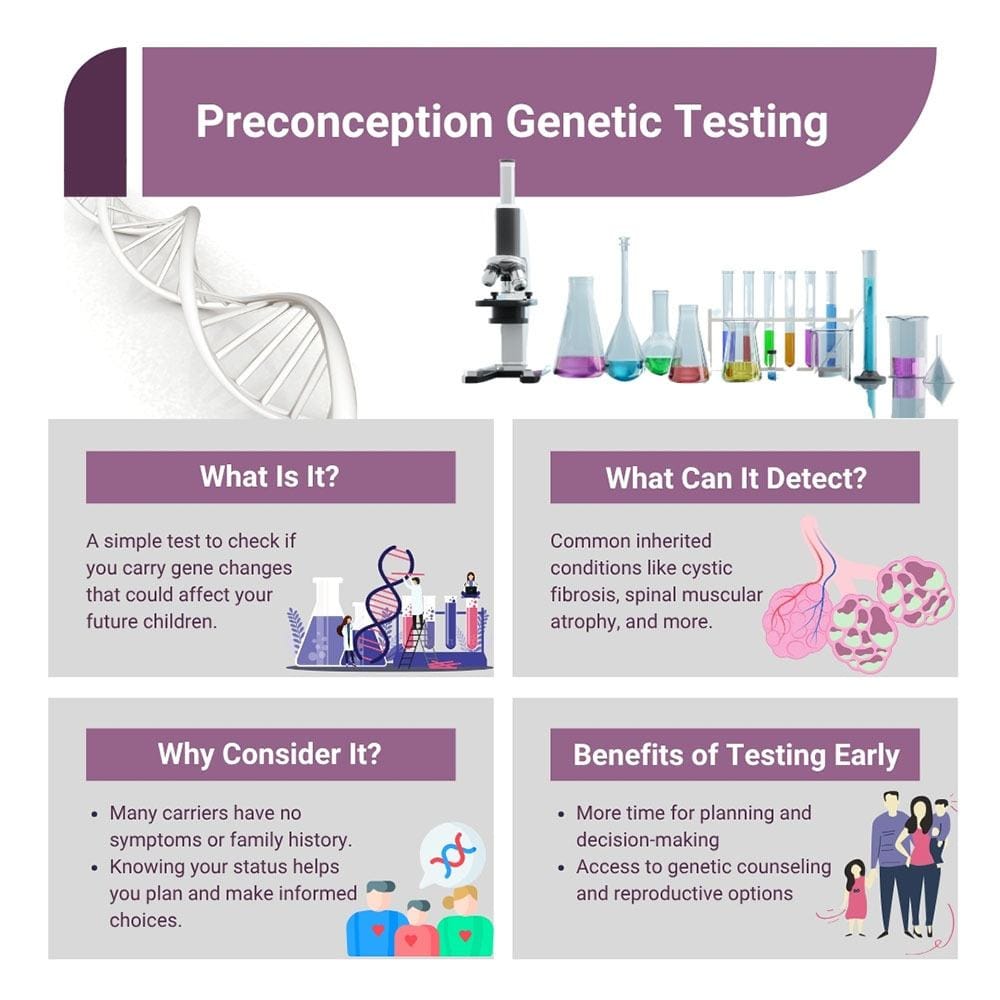What Is Preconception Genetic Testing?
Preconception genetic testing examines your DNA to identify whether you carry genes linked to inherited health conditions. This testing helps you understand the chances of passing certain genetic disorders to your future children before you get pregnant. It’s basically carrier screening for inherited disorders, performed by the medical professionals at Cohen Medical Practice (CMP) in New York like Dr. Felix Cohen, a board certified obstetrician-gynecologist.
Preconception testing supports informed decisions about your reproductive options. Even if you feel healthy and have no family history of genetic issues, you may still carry genetic changes that don’t affect you or your health. If both you and your partner carry a mutation in the same gene, you may explore alternative paths to conceiving. The fertility services at CMP New York can help.

What Conditions Can Preconception Genetic Testing Detect?
Carrier screening for inherited disorders determines if you carry genetic mutations associated with certain diseases. The most effective time to undergo preconception genetic testing is before pregnancy. Testing early gives you time to explore your results and speak with a genetic counselor in New York City.
This preconception genetic test detects common conditions such as:
- Cystic fibrosis
- Spinal muscular atrophy
- Tay-Sachs disease
- Sickle cell disease
- Thalassemia
- Fragile X syndrome
- Bloom syndrome
- Canavan disease
- Gaucher disease
- Maple syrup urine disease
- Mucolipidosis and mucopolysaccharidosis
- Fanconi anemia
- Phenylketonuria
In addition to these conditions, an expanded carrier screening for inherited disorders includes hundreds of rare diseases. This comprehensive approach identifies risks beyond the capabilities of a standard test, even if you have no family history of the disease. When you get your carrier status before becoming pregnant, you eliminate surprises later. You feel empowered in your reproductive choices with clear, scientific information in hand.
How Is Preconception Genetic Testing Different from Prenatal Genetic Testing?
Genetic testing is helpful before deciding to get pregnant, but it’s also useful while you’re pregnant. Each testing type has a different purpose.
The key differences between preconception genetic testing and prenatal genetic testing include:
- Preconception testing takes place before pregnancy to assess your carrier status.
- Prenatal testing is done while you’re pregnant to evaluate the fetus for genetic conditions.
- Preconception tests analyze your DNA, while prenatal tests focus on fetal DNA or chromosomes.
Testing before a pregnancy allows for greater flexibility and planning. After getting pregnant, you may have to make time-sensitive decisions based on the fetal health. Both forms of testing provide useful information, and many people choose to do both at the appropriate time to support their decisions.
What Can I Expect from the Preconception Genetic Test Procedure?
Preconception genetic tests start with either a blood or saliva sample. If no concerning gene variants are found, your partner may not need testing. But if you’re found to be a carrier of a certain condition, your partner should be tested to assess your future child’s potential risk. After your sample is collected, it’s sent to a lab where specialists examine your genetic structure.
At CMP New York, advanced carrier screening for inherited disorders is available through expanded panels like the Horizon panel and the beacon panel, which screen for hundreds of genetic conditions. If you’re a carrier of a certain gene, you can pass it to your child.
If you and your partner are both carriers for the same recessive disease, such as cystic fibrosis, each of your biological children has:
- A 25 percent chance of inheriting the condition
- A 50 percent chance of being a carrier like you
- A 25 percent chance of not being affected or carrying the gene
How Long Does It Take to Get My Preconception Genetic Testing Results?
Expect two to three weeks before you receive your results from a standard carrier screening panel. Some tests, like those that screen for fewer conditions, may return results in as little as one week. Broader panels, like the Horizon panel or the beacon panel, may take up to four weeks.
Several factors affect how long you wait, such as the lab your doctor uses, the number of conditions being screened and whether your partner also needs testing. Once your results are ready, your doctor meets with you to review the findings, explaining the test results, discussing the implications and guiding you through the next steps.
You may desire:
- Further testing
- Genetic counseling
- A risk assessment
Reproductive options, such as in vitro fertilization with genetic testing of embryos
Where Can I Get Preconception Genetic Testing?
At CMP New York, a leading Midtown Manhattan gynecology practice, you receive expert care in a supportive environment. This practice specializes in feminine health, gynecological services, female aesthetics and birth control options. Dr. Cohen offers comprehensive genetic screening designed to give you peace of mind before you conceive.
When you choose CMP New York for preconception testing, you’re getting personalized guidance from a team that puts your health and future first. Whether you’re concerned about your family history or simply want to be informed, book an appointment today at CMP New York. Learn your genetic background confidentially and confidently.

